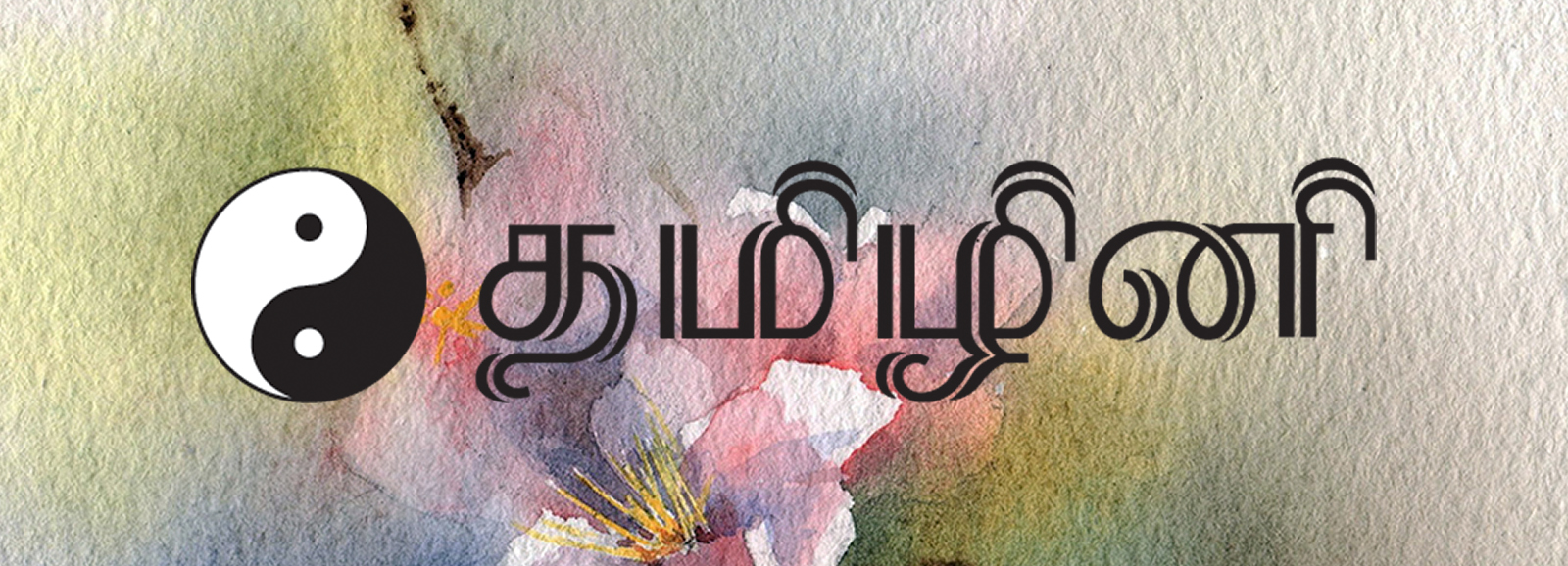One of the fallouts of having a home-schooled daughter is that you get to do certain things you wouldn’t otherwise do. I have been revisiting some of the English classics along with her and relishing the experience. A recent addition was Walter Scott’s Ivanhoe. I now realize that Scott does not hold a very high place in serious literary canon. But during my growing up years, Scott held an important place for me. While I could get most of the classics only in abridged form, our school library had a good collection of Scott’s originals in beautiful, fragrant hardbound editions. Next to Shakespeare, whose complete works I had with me, Scott was the writer who I happened to read the most in unabridged form.
However, I had read Ivanhoe, which was my first and favorite Scott book, only in an abridged version. It then held appeal as a fantastic tale of knights and romance with Ivanhoe, Robin Hood and King Richard the Lion-heart, all appearing incognito. Now was the time to make amends and read the original in full. In what is otherwise a formulaic romantic historical fiction (though Scott was the original maker and master of the formula), what struck me the most now was the treatment of Jews in this work. Scott’s sharp characterization and insightful conversations raises the book from historical fiction to a prescient work on Jews.
For its depiction of Jews, and the Christian attitudes towards them, it merits comparison with Shakespeare’s The Merchant of Venice. Shakespeare has written some of the most memorable lines in his play but Scott scores over Shakespeare in his sympathetic treatment of Jews. Both of them bring out the extreme prejudices held by Christians against the Jews in the middle ages, and perhaps during their respective eras too. Of course, over 200 years and a host of historical changes separated them. In 1290, the properties of Jews were confiscated and the Jews were persecuted and banished from England by King Edward I. They were readmitted into England only in 1656 by Oliver Cromwell. During Shakespeare’s time there was no large Jewish community in England. However, based on a deeper reading of The Merchant of Venice, the charge could be laid on Shakespeare that he himself might be anti-Judaic but Scott of Ivanhoe comes out more or less unscathed.
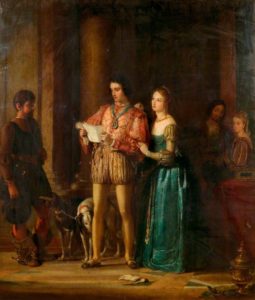
Both books feature a father and daughter pair – Shylock and Jessica in The Merchant of Venice, and Isaac and Rebecca in Ivanhoe. Both Shylock and Isaac are tight-fisted with their money, and both of them are moneylenders. In both books, the choicest abuses are hurled at the Jews right in their faces, and they usually bear it without protest. Shylock, when presented with an opportunity, seeks revenge, which leads to his downfall. Isaac is far shrewder and would do nothing that would hurt his business interests, and yet faces all possible hardships. Antonio would be prepared to die for his Christian friends but has nothing but contempt for Shylock. Ivanhoe, though not entirely free of prejudice, risks his life to save both Isaac and Rebecca on different occasions.
When Isaac makes his entry into the dining area where Saxons and Normans were present, the scene is described thus: ’Introduced with little ceremony, and advancing with fear and hesitation, and many a bow of deep humility, a tall thin old man, who, however, had lost by the habit of stooping much of his actual height, approached the lower end of the board. His features, keen and regular, with an aquiline nose, and piercing black eyes; his high and wrinkled forehead, and long grey hair and beard, would have been considered as handsome, had they not been the marks of a physiognomy peculiar to a race, which, during those dark ages, was alike detested by the credulous and prejudiced vulgar, and persecuted by the greedy and rapacious nobility, and who, perhaps, owing to that very hatred and persecution, had adopted a national character, in which there was much, to say the least, mean and unamiable.”
Nobody makes space for him at any table in the room – not the domestic attendants, nor the Saracen (Arab) slaves. It is left to the hero to vacate his table. He then saves Isaac from being robbed and killed. “Upon the slightest and most unreasonable pretenses, as well as upon accusations the most absurd and groundless, their persons and property were exposed to every turn of popular fury; for Norman, Saxon, Dane, and Briton, however adverse these races were to each other, contended which should look with greatest detestation upon a people, whom it was accounted a point of religion to hate, to revile, to despise, to plunder, and to persecute.”
Shylock, on the other hand, when he is invited by Bassanio to dine with Antonio to discuss the terms of the loan, says, “I will buy with you, sell with you, talk with you, walk with you, and so following, but I will not eat with you, drink with you, nor pray with you.”
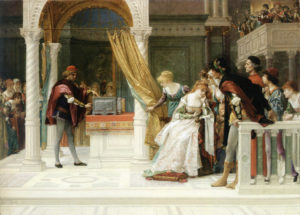
Isaac is treated as an untouchable. He is not allowed to come in close proximity with the Christian knights or to touch them. He is allotted the worst room in their castles, if at all he is allowed entry. He is repeatedly called the ‘most accursed dog of an accursed race.’ He never retorts nor even flinches. He tells Rebecca, “O, daughter, disinherited and wandering as we are, the worst evil which befalls our race is, that when we are wronged and plundered, all the world laughs around, and we are compelled to suppress our sense of injury, and to smile tamely, when we would revenge bravely.”
Shylock frets and fumes at the constant barrage of humiliating insults hurled at him.
“Signor Antonio, many a time and oftIn the Rialto you rated meAbout my moneys and my usances;Still have I borne it with a patient shrug,For sufferance is the badge of all our tribe;You call me misbeliever, cut-throat dog,And spit upon my Jewish gaberdine,And all for use of that which is mine own.”
Antonio is unrelenting in his open expression of disdain for Shylock.
“I am as like to call thee so again,To spit on thee again, to spum thee too.If thou wilt lend this money, lend it notAs to thy friends-for when did friendship takeA breed for barren metal of his friend?-But lend it rather to thine enemy,Who if he break thou mayst with better faceExact the penalty.”
Shylock is not certain whether he hates Antonio for being a Christian who abuses him frequently, or because he lends out money without interest and brings down the rate of interest in Venice. Hence, instead of interest, he seeks to add the clause for extracting an equal pound of his flesh in case of default. “I like not fair terms and a villain’s mind,” rues Bassanio.
Shylock’s daughter, Jessica, is in love with a Christian friend of Antonio, Lorenzo. She is ashamed to be her father’s child. “Though I am daughter to his blood/ I am not to his manners!” she says and is more than willing to convert to Christianity and marry Lorenzo. She steals money and jewels from her father and runs away with Lorenzo. “This making of Christians will raise the price of hogs. If we grow all to be pork-eaters we shall not shortly have a rasher on the coals for money,” the clown Lancelot tells her in a wicked jest.
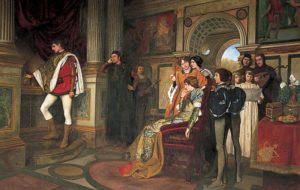
Scott completely inverts this character in his novel. While Isaac does have some shades of Shylock, Scott’s Rebecca is the opposite of Shakespeare’s Jessica. She is loyal to her father and her religion. “I am a maiden, unskilled to dispute for my religion, but I can die for it, if it be God’s will,” she avers. She exerts enormous influence over her father and he does everything she bids. She is full of unsaid love for Ivanhoe but knows her religion put him out of reach for her and he was pining for another girl. She is loved by the Templar, Bois-Guilbert, who kidnapped her, but refuses to requite his love.
Isaac is reluctant to open up his purse when he and his daughter were captured but would spare no expense and effort to get her back when the Templar carries her away. Scott writes, “Above all, he had upon his side the unyielding obstinacy of his nation, and that unbending resolution, with which Israelites have been frequently known to submit to the uttermost evils which power and violence can inflict upon them, rather than gratify their oppressors by granting their demands.”
Isaac faces up to his frequent misfortunes with a resigned resolution. “And thus it is probable, that the Jews, by the very frequency of their fear on all occasions, had their minds in some degree prepared for every effort of tyranny which could be practiced upon them; so that no aggression, when it had taken place, could bring with it that surprise which is the most disabling quality of terror.”
Shylock, though, regrets the loss of his money more than his daughter. His agitated state is reported by an associate of Bassanio:
I never heard a passion so confused,So strange, outrageous, and so variable
As the dog Jew did utter in the streets“My daughter! O, my ducats! O, my daughter!Fled with a Christian! O, my Christian ducats!Justice! The law! My ducats and my daughter!A sealed bag, two sealèd bags of ducats,
Of double ducats, stol’n from me by my daughter!And jewels, two stones, two rich and precious stones,
Stol’n by my daughter! Justice! Find the girl!
She hath the stones upon her, and the ducats!”
Shylock laments later, when he couldn’t find the runaway couple, “The thief gone with so much, and so much to find the thief; and no satisfaction, no revenge.”
Shylock embarks on his dangerous game of vengeance on Antonio. But the lovely Rebecca, like her father, is much more grounded. ‘Yet had the Jewess this advantage, that she was better prepared by habits of thought, and by natural strength of mind, to encounter the dangers to which she was exposed. Of a strong and observing character, even from her earliest years, the pomp and wealth which her father displayed within his walls, or which she witnessed in the houses of other wealthy Hebrews, had not been able to blind her to the precarious circumstances under which they were enjoyed. Like Damocles at his celebrated banquet, Rebecca perpetually beheld, amid that gorgeous display, the sword which was suspended over the heads of her people by a single hair. These reflections had tamed and brought down to a pitch of sounder judgment a temper, which, under other circumstances, might have waxed haughty, supercilious, and obstinate.’
When she takes up the mortally injured Ivanhoe under her expert medical care, ‘the gentleness and candor of Rebecca’s nature imputed no fault to Ivanhoe for sharing in the universal prejudices of his age and religion. On the contrary the fair Jewess, though sensible her patient now regarded her as one of a race of reprobation, with whom it was disgraceful to hold any beyond the most necessary intercourse, ceased not to pay the same patient and devoted attention to his safety and convalescence.’
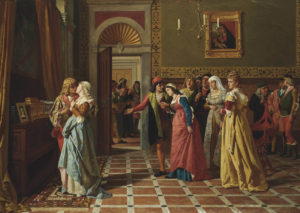
All she requests of Ivanhoe was this: ”I will but pray of thee to believe henceforward that a Jew may do good service to a Christian, without desiring other guerdon than the blessing of the Great Father who made both Jew and Gentile.”
There are others also, most notably Robin Hood, who she had cured through her exclusive knowledge of medicine, ‘secrets which have been handed down since the days of Solomon’.
Scott gives voice to the centuries old regrets and aspirations of the Jews through the words of Rebecca:
/“I am, indeed,” said Rebecca, “sprung from a race whose courage was distinguished in the defense of their own land, but who warred not, even while yet a nation, save at the command of the Deity, or in defending their country from oppression. The sound of the trumpet wakes Judah no longer, and her despised children are now but the unresisting victims of hostile and military oppression./
/still less would it advantage me to explain, that the peculiarities of my dress, language, and manners, are those of my people – I had well-nigh said of my country, but alas! we have no country./
/”God,” said Rebecca, “is the disposer of all. He can turn back the captivity of Judah, even by the weakest instrument. To execute his message the snail is as sure a messenger as the falcon./
/”Lamented be the hour,” said Rebecca, “that has taught such art to the House of Israel! but adversity bends the heart as fire bends the stubborn steel, and those who are no longer their own governors, and the denizens of their own free independent state, must crouch before strangers./
When Rebecca was charged with using black magic for curing people, she feels, “my soul is disquieted, and I wot not why. This charge of necromancy is right often used for cloaking evil practices on our people.”
During her combative conversations with the Templar, and during the subsequent trial, she mounts a spirited defense of her people.
/“Thou hast spoken the Jew,” said Rebecca, “as the persecution of such as thou art has made him. Heaven in ire has driven him from his country, but industry has opened to him the only road to power and to influence, which oppression has left unbarred. Read the ancient history of the people of God, and tell me if those, by whom Jehovah wrought such marvels among the nations, were then a people of misers and of usurers!—And know, proud knight, we number names amongst us to which your boasted northern nobility is as the gourd compared with the cedar—names that ascend far back to those high times when the Divine Presence shook the mercy-seat between the cherubim, and which derive their splendor from no earthly prince, but from the awful Voice, which bade their fathers be nearest of the congregation to the Vision – Such were the princes of the House of Jacob.”
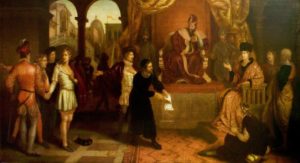
Rebecca’s color rose as she boasted the ancient glories of her race, but faded as she added, with at sigh, “Such WERE the princes of Judah, now such no more! – They are trampled down like the shorn grass, and mixed with the mire of the ways. Yet are there those among them who shame not such high descent, and of such shall be the daughter of Isaac the son of Adonikam! Farewell!—I envy not thy blood-won honors – I envy not thy barbarous descent from northern heathens—I envy thee not thy faith, which is ever in thy mouth, but never in thy heart nor in thy practice.”/
Throughout this narrative, Scott throws hints of an impending mass persecution, possibly having in mind the persecution that was to come later during Richard’s reign in some measure (which was subdued) and more severely 100 years after this tale during Edward I’s reign, but also being perceptive about the persecution that was to come in Europe 100 years after his own time.
Scott places an anonymous epigraph in one of the chapters, which accurately depicts the flames of the ensuing fanaticism.
“Arouse the tiger of Hyrcanian deserts,
Strive with the half-starved lion for his prey;Lesser the risk, than rouse the slumbering fire
Of wild Fanaticism.”
Condemned to death on charges of necromancy, Rebecca is saved by Ivanhoe, after she calls for a ‘Trial by Combat’ (a ‘throw-forward’ to G.R.R.Martin’s Game of Thrones) at the hinting of her abductor himself. In the trial hall, full of fanatics, there is a disabled man, who had been saved by her medicine before, willing to be her messenger to Ivanhoe.
Her abductor, Bois-Guilbert, was besotted with the disarming charm of Rebecca. “Answer me not,” says the Templar, “by urging the difference of our creeds; within our secret conclaves we hold these nursery tales in derision.” He was repulsed by the fanatic persecution of her by his fellow Templars, and bristles with impotent rage, ”I will break forth and fly – fly to some distant land, to which folly and fanaticism have not yet found their way. No drop of the blood of this most excellent creature shall be spilled by my sanction.” But he is compelled to stay on and fight in the combat against Ivanhoe and embraces his death.
“Will future ages believe that such stupid bigotry ever existed!” writes Scott.
In the trial in The Merchant of Venice, it is Shylock who is persecuting Antonio. Shakespeare paints his portrait as darkly as possible.
‘A stony adversary, an inhuman wretch,Uncapable of pity, void and emptyFrom any dram of mercy.’
He is outwitted by Portia, in the disguise of a male lawyer, after he turns a deaf ear to her endearing appeals for mercy.
“The quality of mercy is not strain’d;
It droppeth as the gentle rain from heavenUpon the place beneath. It is twice blest:
It blesseth him that gives and him that takes.”
Finally the mercy that Portia and Antonio expected of him is extended to him on one condition: that he becomes Christian and bequeaths his wealth to his now Christian daughter.
These two tales go on to show that Hitler did not arise out of the blue. There had been an extended acrimonious relationship between the Christians and the Jews. The extermination of Jews by the Nazis was only the culmination of many centuries of discrimination and persecution. The best of English writers was himself not untouched by these prejudices against the Jews. But Shakespeare does redeem himself to an extent with these lasting words, though it goes against the grain of the flowing tirades against the Jews in his play. Scott also cites this in an epigraph in Ivanhoe.
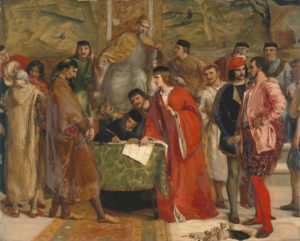
“Hath not a Jew eyes? Hath not a Jew hands, organs, dimensions, senses, affections, passions? Fed with the same food, hurt with the same weapons, subject to the same diseases, healed by the same means, warmed and cooled by the same winter and summer, as a Christian is? If you prick us do we not bleed? If you tickle us do we not laugh? If you poison us do we not die?”
But it is a travesty of historical justice that after the Jews reclaimed the much yearned-for land of their ancestors they have turned into the oppressors. In the same passage given above, Shylock continues:
“And if you wrong us shall we not revenge? If we are like you in the rest, we will resemble you in that. If a Jew wrong a Christian, what is his humility? Revenge. If a Christian wrong a Jew, what should his sufferance be by Christian example? Why, revenge. The villainy you teach me I will execute, and it shall go hard but I will better the instruction.”
Instead of the Christians, the Palestinians are facing the fury of their revenge.
And in another curious turn of events, we have been witnessing some erudite Brahmins in India equating their position with that of the persecuted Jews. There has been some deep provocation by the Dravidian Movement, which often used condemnable vitriolic rhetoric to fight and challenge the real and perceived domination of Brahmins in the social, cultural and political spaces. Yet, in reality, what the Brahmins have undergone is the leveling of accumulated privilege and not persecution. Going by these literary accounts, the equivalence with the persecution of Jews is false and farcical to say the least. Given the near untouchability and oppression practiced against the Jews despite their riches for nearly two millennia, if any community can draw some sort of equivalence with them, it is, unfortunately, the Dalits, and, increasingly, the Muslims.
These two literary classics serve a warning to the imminent danger of the fanatical religious and political movements that have been springing up across the world, including India. Once prejudices and hatred become deep-seated and the slumbering fires of wild fanaticism are roused, they will rage undoused for many centuries; the adverse impact would last interminably.
